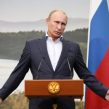
WARSAW BLOCKS EU-RUSSIAN NEGOTIATIONS ON COOPERATION PACT
Publication: Eurasia Daily Monitor Volume: 4 Issue: 13
By:

The press has recently focused on Russia’s relations with the European Union over natural gas issues. But Moscow has been playing diplomatic hardball with former Warsaw Pact member Poland over meat imports. In response, since late 2006 Poland has blocked the initiation of talks on a new Stability and Cooperation Pact between the EU and Russia, and there is no resolution to the impasse in sight. The Polish opposition is the first occasion that one of the ten new states that joined the EU in 2004 has blocked such an important EU agreement. The trade issues underlying the dispute are significant, as the EU supplies Russia with up to a third of its meat.
Russia’s envoy to the EU Vladimir Chizov said, “The Poles are still linking their veto on talks with the meat imports issue. The subject will be addressed this week. If they (the experts) are satisfied (with Polish measures), we will take all necessary steps to resume imports of meat and meat products from Poland” (RIA-Novosti, January 15).
In November 2005 Russia banned Polish meat imports, alleging that Polish shipments violated Russian veterinary regulations amid health concerns. A year later Russian President Vladimir Putin said that while Moscow had problems with Polish meat imports per se, it was concerned about third party meat imports transshipped through Poland to Russia. Warsaw sees the Russian action as thinly disguised retaliation for its supports of neighboring Ukraine’s 2004 Orange Revolution, which replaced the pro-Moscow government of Prime Minister Viktor Yanukovych with the Western-oriented administration of Viktor Yushchenko.
Russia has also harshly negotiated with the European Commission over a proposed trade memorandum concerning EU meat, dairy, and fish exports to Russian by threatening to ban EU imports because of concerns over animal health in Bulgaria and Romania. Bulgaria and Romania joined the EU on January 1. European Union health and consumer protection commissioner Markos Kyprianou placated Moscow by agreeing in the interim to exclude Bulgarian and Romanian meat products from EU exports to Russia. The stakes are substantial, as EU-Russian trade in 2006 reached $2.2 billion.
On January 15, following a meeting with Polish Agriculture Minister Andrzej Lepper, Kyprianou told journalists, “We have to be realistic. It’s a complex issue and there is a possibility that it cannot be resolved at just one meeting”(RFE/RL, January 17). The EU currently provides Russia with almost 80% of its beef imports and 50% of its pork imports (BBC, June 7, 2004).
Russia has not hesitated to use agricultural bans in the past. In 2002 U.S. exports of chicken to Russian, which supplied 635,000 tons of poultry, or 67% of the Russian market, was temporarily halted because of purported concerns over salmonella contamination and concerns that the United States used too many antibiotics in its chicken processing (RIA-Novosti, January 4). At the time U.S. Secretary of State Colin Powell said, “I am more worried about chickens going back and forth than missiles going back and forth ”(Jamestown Monitor, May 20, 2002). Russia was the world’s largest importer of American chickens, buying $800 million annually. Analysts noted that the unilateral Russian action might have been prompted by Washington’s considerations of tariffs of up to 30% against Russian steel imports. Poultry consisted of 20% of all U.S. exports to Russia and were popularly known as “Bush legs” after the then-president, George H.W. Bush. Sounding a note of protectionism, the head of the State Duma foreign affairs committee, Dmitry Rogozin, said, “It is well known that the massive import of U.S. chicken meat which has been farmed using who knows what has killed off Russian poultry farming” (AFP, March 10, 2002).
The tactics could rebound on Russia if the EU decides to begin examining its own agricultural imports from Russia. In 2006 Russia was forced to begin the mass vaccination of millions of poultry in southern Russia to try to stop the spread of the lethal H5N1 bird flu virus, which was blamed for nearly a million poultry deaths after first appearing in Siberia in August 2005 (BBC, March 10, 2006). Liberal Democratic Duma member Alexei Mitrofanov claimed that avian bird flu was invented by Americans, telling parliamentarians, “There is no such thing as bird flu, just as there is no AIDS, tulip or mad cow disease. It is a provocation by Americans. They want to eliminate all chickens in Europe so that we have to import ‘Bush’s legs’”(Rosbalt, October 21, 2005).
In a sign of potential movement on the disagreement, on January 17 the European Commission, the executive branch of the EU, Russian, and Polish experts began meetings in Warsaw to discuss measures taken by Poland to correct the alleged veterinary violations. Another possible resolution to the issue could occur when German Chancellor Angela Merkel, whose country currently holds the six-month rotating EU presidency, meets with Putin on January 21.
Russia’s recalcitrance carries high stakes and could extend well beyond the agricultural sector, as Poland’s obstinacy over the new Russia-EU new Stability and Cooperation Pact could force Moscow to accede to ratifying the Energy Charter and a transit protocol to the Charter, which would force Russia to liberalize its oil and gas sector. All things considered, it is in the Kremlin’s interest to quell the dispute as quickly as possible.




